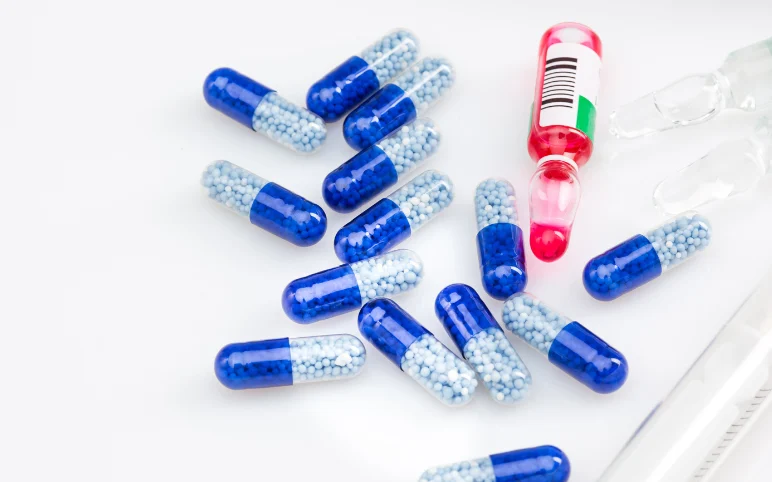Merck to Acquire Imago BioSciences, Inc. for USD 1.35 Billion
While its rumored acquisition of Seagen has yet to materialize, Merck & Co has continued to bolster its pipeline with smaller transactions, the most recent of which was a USD 1.35 billion agreement to acquire Imago BioSciences and its bomedemstat drug candidate for blood disorders. The USD 36 per share bolt-on deal contributes to Merck’s R&D portfolio as it seeks to reduce the proportion of its sales from the USD 17 billion-plus immuno-oncology blockbuster Keytruda (pembrolizumab) and build a hematology franchise.
Bomedemstat (IMG-7289), an oral lysine-specific demethylase 1 (LSD1) inhibitor, is being tested in multiple phase II trials for the treatment of essential thrombocythemia (ET), myelofibrosis (MF), and polycythemia vera (PV). LSD1 is thought to play a role in the maturation of bone marrow blood cells and acts as a driver for certain blood cancers.
Merck has traditionally avoided large-scale M&A but has signaled its interest in recent years with deals such as its USD 11.5 billion acquisition of Acceleron last year and its USD 2.75 billion acquisition of VelosBio in 2020, both of which include hematology assets. Merck was rumored to be on the verge of a USD 30 billion-plus bid for Seagen earlier this year, which never materialized. However, chief executive Rob Davis is still keeping business development ticking over with smaller deals.
For example, Merck exercised a USD 250 million option on a personalized RNA-based cancer vaccine developed by Moderna just last month. Merck has several drug candidates in clinical trials for hematological malignancies, including the BTK inhibitor nemtabrutinib (MK-1026), the anti-LAG-3 antibody favelizumab (MK-4280), and the TIGIT-targeting vibostolimab. The transaction is expected to be completed in the first quarter of 2023.
Regeneron and CytomX Announces Strategic Research Collaboration for Cancer Treatment
CytomX Therapeutics, Inc. and Regeneron Pharmaceuticals, Inc. have announced a strategic research collaboration in the field of conditionally activated bispecific therapeutics for cancer treatment. The collaboration and licensing agreement aim to enable the development of investigational next-generation bispecific immunotherapies using CytomX’s Probody and Regeneron’s Veloci-Bi platforms.
The technology seeks to broaden the therapeutic window by strategically applying Probody’s biologic masking strategies to the development of Regeneron’s investigational bispecific, which remains inactive until activated by proteases in the tumor microenvironment. It will also reduce off-target effects for these next-generation T-cell engaging therapies, as well as address tumor types that have previously been resistant to immunotherapy.
Regeneron, a physician-scientist-led biotech, will be responsible for funding preclinical and clinical development and commercialization activities, while CytomX, an oncology-focused biopharma, will receive a USD 30 million upfront payment with the potential for up to USD 2 billion in research, development, regulatory, and sales-based milestones.
CytomX currently has seven therapeutic candidates in its pipeline, including antibody-drug conjugates (ADCs), T-cell engaging bispecific antibodies (TCBs), and immune modulators such as cytokines and checkpoint inhibitors (CPIs). Its CW-2029, which was developed in collaboration with AbbVie, is an investigational, conditionally activated ADC directed towards CD71 that has shown promising anti-tumor activity in patients with squamous non-small cell lung cancer (NSCLC).
Meanwhile, CTLA-4-targeting Probody therapeutics BMS-986249 and BMS-986288, developed in collaboration with Bristol Myers Squibb, and CX-904, a conditionally activated T-cell-engaging bispecific antibody targeting the epidermal growth factor receptor (EGFR) on tumor cells and the CD3 receptor on T-cells, developed in collaboration with Amgen, are in the clinical pipeline.
FDA Grants Accelerated Approval to ImmunoGen’s ELAHERE for Ovarian Cancer
FDA grants accelerated approval for ImmunoGen’s elahere to treat ovarian cancer. This antibody-drug conjugate (ADC) treatment is specifically used for treating patients who have been previously administered with more than a single therapy regimen, irrespective of Avastin.
The basis of the approval lies with the novel findings on objective response rate (ORR) and duration of response (DOR), both observed in Soraya clinical trial. The antibody-drug conjugate comprises an FRα-binding antibody, a cell-surface protein prominent in the ovarian tumour, and the maytansinoid payload DM4. Elahere is a pioneer ADC drug that has revied FDA approval for platinum-resistant disease.
ImmunoGen president and CEO Mark Enyedy said: “With an indication for use regardless of prior treatment with Avastin, we believe Elahere is positioned to become the new standard of care for patients with FRα-positive platinum-resistant ovarian cancer.
“Elahere’s accelerated approval is a testament to the decades of work dedicated to developing the next generation of ADCs and marks ImmunoGen’s transition to a fully-integrated oncology company and the start of an exciting new chapter for us as a leader in the development and commercialisation of innovative oncology products.”
Further approvals for the drug are based on its results showing clinical benefits in its confirmatory trial. Moreover, the randomised MIRASOL trial will be carried out early next year. As per the licencing agreement, Eli Lilly and Company has the exclusive rights to conduct the R&D, and marketing of the potent entities.
FDA Grants Priority Review to Epcoritamab for Relapsed/Refractory LBCL
FDA accepted priority review the Biologics License Application for AbbVie and Genmab’s epcoritamab. The application is supported by the data obtained from EPCORE NHL-1 Phase I/II trail results which was conducted to evaluate safety and efficacy of subcutaneous epcoritabmab in patients with relapsed, progressive or refractory CD20+ mature B-cell non-Hodgkin’s lymphoma. AbbVie and Genmab’s epcoritamab is an investigational subcutaneous bispecific antibody that is developed for the treatment of adult patients with relapsed refractory large B-cell lymphoma (LBCL).
“We are committed to the research and development of innovative therapies to provide important treatment options for people living with blood cancer such as large B-cell lymphoma, which has limited treatment options in the relapsed/refractory setting,” said Mohamed Zaki , M.D., Ph.D., vice president and head, global oncology development, AbbVie. “This milestone signals an early step in our hope to develop a core therapy for people living with B-cell malignancies.”
To treat adult patients with relapsed/refractory diffuse large B-cell lymphoma (DLBCL), the European Medicines Agency recently validated a Marketing Authorization Application for epcoritamab. Both the parent companies of epcoritamab will share commercial responsibilities in the U.S. and Japan. Whereas, AbbVie will take further responsibility of commercialization.
Provention Bio Secures FDA Approval for Teplizumab as a Treatment to Delay Late-stage Type 1 Diabetes
On November 17, 2022, Provention Bio announced that the US FDA had approved the Biologics License Application (BLA) for TZIELD (teplizumab-mzwv). Teplizumab is an anti-CD3-directed antibody for intravenous use, and with clearance from the FDA, it is now the first and only immunomodulatory treatment approved to delay the onset of Stage 3 Type 1 Diabetes (T1D) in adult and pediatric patients aged 8 years and older with stage 2 Type 1 Diabetes.
TZIELD injection is supplied as a sterile, preservative-free, clear, and colorless solution in a 2 mg/2 mL (1 mg/mL) single-dose vial for intravenous use. TZIELD was studied in the TN-10 study, a pivotal randomized, double-blind, event-driven, placebo-controlled clinical trial for the delay of T1D (Stage 3 or clinical T1D) in Stage 2 T1D patients, defined by the presence of two or more T1D-related autoantibodies and dysglycemia.
Earlier in October this year, Provention Bio announced a co-promotion agreement with Sanofi for the U.S. launch of TZIELD. As per the agreement, Sanofi will commit to commercial resources in the United States to expand the number of key healthcare professionals reached in the United States. In exchange, Provention will reimburse field force-related expenses that Sanofi will incur in connection with commercializing teplizumab. In the United States, over 1.8 million people have Type 1 Diabetes, an autoimmune disease caused by the destruction of beta cells. The approval of the TZIELD is anticipated to improve the treatment of Type 1 Diabetes.
FDA Backs Ardelyx’s Chronic Kidney Disease (CKD) Therapy Xphozah
On November 16, 2022, Ardelyx, Inc. (Nasdaq: ARDX) announced the favorable result of the U.S. Food and Drug Administration’s (FDA) Cardiovascular and Renal Drugs Advisory Committee (CRDAC) for XPHOZAH for the control of serum phosphorus in adult patients with chronic kidney disease (CKD) on dialysis. Ardelyx’s XPHOZAH (tenapanor) is an investigational first-in-class phosphate absorption inhibitor (PAI). XPHOZAH, with its unique blocking mechanism of action, acts locally in the gut to inhibit the sodium hydrogen exchanger 3 (NHE3), reducing phosphate absorption through the paracellular pathway, the primary pathway of phosphate absorption.
As per the update, the CRDAC committee voted nine to four, stating that the benefits of treatment with XPHOZAH outweigh its risks for controlling serum phosphorus in adults with CKD on dialysis when administered as a monotherapy. Moreover, the committee voted ten to two, with one abstention, that the benefits of treatment with XPHOZAH in combination with phosphate binder treatment outweigh its risks.
The kidney plays a key role in regulating phosphorus levels, but when kidney function is significantly impaired, phosphorus is not adequately eliminated from the body. Hyperphosphatemia is a prominent condition among people with Chronic Kidney Disease on dialysis. As per DelveInsight, in 2017, the total prevalent population of Chronic Kidney Disease (CKD) was 35,288,900+ in the United States. Hyperphosphatemia is anticipated to affect more than 745,000 dialysis patients in major developed countries. The approval of the therapy, XPHOZAH is expected to significantly improve the outcome for the patient affected with Hyperphosphatemia.



